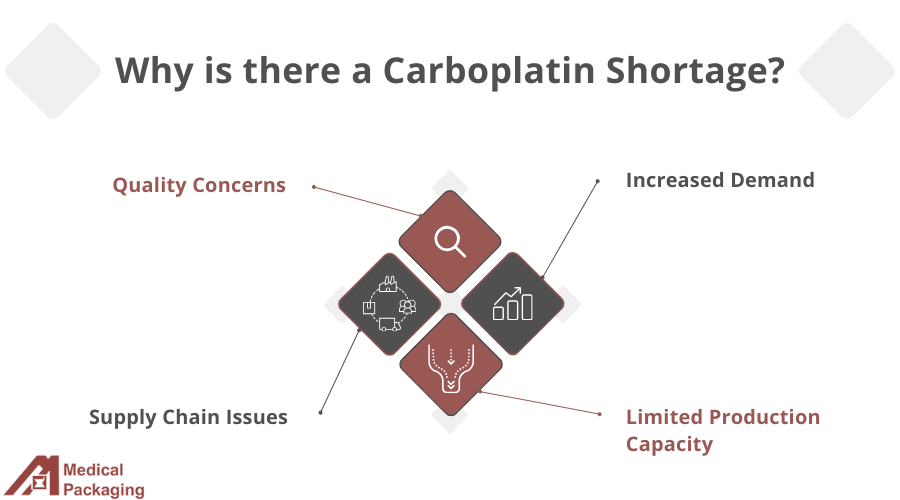Carboplatin Shortage: The Impact of Drugs in Short Supply Nationwide
Carboplatin, a crucial chemotherapy drug widely used in the United States and globally, has been pivotal in the treatment regimens of a wide array of cancers, including ovarian, lung, and breast cancer. Its unique efficacy in chemotherapy cycles has helped countless patients improve their lives after a cancer diagnosis. Since early 2023, the availability of this oncology drug has been affected, leading to what is now often referred to as the ‘carboplatin shortage.’
The limited supply of carboplatin and shortage of cisplatin, a similar platinum-based chemotherapy drug, has sparked concerns among health care providers, pharmaceutical manufacturers, and most critically, the patients who heavily rely on this drug for their treatment regimes. In 2023 alone, the carboplatin shortage has escalated to the point where it has become a national concern, challenging the very foundations of patient care, elevating health costs, and driving a chaotic scramble for alternatives.
In short, the current carboplatin shortage can largely be attributed to supply chain disruptions, limited production capacity, and quality concerns. Further, it poses a significant risk in the treatment of cancers primarily ovarian, lung, and breast cancer, among others, and necessitates an immediate, robust response from all stakeholders in the healthcare sector.
Understanding the Carboplatin Shortage
Upon initiating discussion on this alarming issue, it is pivotal to understand the root causes leading to the carboplatin shortage. While one might easily jump to the conclusion that the shortages stem from a sudden surge in demand for the drug, the reality is far more complex. The trust cause can be attributed to supply chain issues, increased demand, limited production capacity, and quality problems which collectively contribute to the present crisis.
Increased Demand
The simplest reason for a shortage is a spike in demand. Demand for carboplatin has been rising due to its effectiveness in treating various cancers. An increase in cancer diagnoses or changes in treatment protocols that favor carboplatin can lead to a sudden spike in demand, which existing production capacities may struggle to meet.
Supply Chain Issues
Supply chain disruptions have been at the forefront of causes. Often, these disruptions are due to sudden changes in regulations, logistical issues, or even natural disasters leading to manufacturing delays. In the case of carboplatin, factories across the United States have struggled to maintain steady production due to unforeseen disruptions, further exacerbating the short supply situation.
Limited Production Capacity
Production capacity is another significant reason marking the current shortage. This limitation is deep-rooted in the elaborate process of cancer drug manufacturing, which, often is hindered by regulatory hurdles and infrastructural constraints. According to a news release from the National Cancer Institute, some manufacturing facilities producing carboplatin have faced persistent issues related to quality standards, prompting unplanned shutdowns and, in some cases, product recalls.
Quality Concerns
Finally, certain generic drugs like carboplatin are vulnerable to quality concerns. Today, more than ever, pharmaceutical companies need to ensure the highest quality of drugs since any compromise can impact patient health severely, increasing the risk of adverse effects. Quality concerns have forced multiple pharmaceutical companies, including Intas Pharmaceuticals, which according to NBC News, at one point was supplying 50% of all Cisplatin to the United States, to slow down or even halt production while these issues are rectified.
It is crucial to comprehend that a shortage like carboplatin impacts more than just the manufacturer’s bottom line. It bears significant health care implications, particularly on patient care. In the following section, we will analyze how this shortage is influencing patient care delivery, and more specifically, how it is impacting those battling breast cancer, ovarian cancer, and lung cancer.
The Impact of Drug Shortages on Oncology Drugs like Carboplatin
The repercussions of the chemotherapy drug shortages extend far beyond the pharmaceutical industry’s parameters, striking at the very core of health care systems and affecting the well-being of patients. The shortage compromises the timely and effective delivery of patient care in oncology, given the pivotal role that carboplatin plays in cancer treatment.
Treatment Disruption
Most importantly, among the concerns raised by this shortage is the disruption of therapeutic continuity for patients. Carboplatin is an integral component in the treatment regimens of many types of cancer, including but not limited to, ovarian cancer, lung cancer, testicular cancer, and breast cancer. When the supply of such a crucial drug dwindles, it becomes a direct challenge to cancer centers and patients. In extreme cases, cancer patients are facing therapy disruptions and unplanned treatment amendments, potentially resulting in less favorable outcomes.
Ethical Concerns for Drug Rationing
These concerns come with many ethical considerations as health care professionals have to deal with the consequences of shortages. According to OncLive, doctors are having to alter standard treatment protocols in light of carboplatin and cisplatin shortages prioritizing patients who are more likely to be cured, patients currently in clinical trials to not disrupt research, and subbing carboplatin for cisplatin where possible.
This often involves difficult decisions, such as favoring younger patients with better overall health prospects over older or frailer patients who might experience severe side effects from alternative treatments. Doctors must also ensure clear communication with patients and their families, providing honest and compassionate explanations of the situation and available options.
Measures Being Taken to Address the Shortage of Carboplatin and Other Oncology Drugs
In response to the ever-mounting crisis surrounding the carboplatin shortage, various entities within the pharmaceutical landscape have rallied to address and mitigate the ongoing disruptions. These range from governmental entities like the Food and Drug Administration (FDA) to pharmaceutical companies and non-profit organizations committed to patient health.
FDA Control
The FDA plays a critical role in managing drug shortages by working closely with drug manufacturers to address and prevent drug shortages with long-term solutions. They monitor the drug supply for potential shortages, coordinate with manufacturers to fix production issues and expedite the review of new manufacturing sites, drug suppliers, and manufacturing changes to prevent the shortages. In the wake of the current shortage, the FDA has ramped up its efforts to coordinate with pharmaceutical manufacturers to increase production and ensure quality standards.
Increasing Production
Beyond their scope, pharmaceutical companies like Pfizer and others are also creating solutions. By focusing on manufacturing process optimization and enhancing the supply chain’s resilience, these companies are trying to prevent future chemotherapy shortages and address the current deficiency of carboplatin.
Awareness
Further, a growing number of nonprofit organizations are making concerted efforts to alleviate the crisis. These groups work by advocating for drug shortage reform, raising public awareness about the impact of drug shortages, and pushing for policy changes to ensure the provision of quality and affordable medication.
Despite these efforts, it is essential to acknowledge that overcoming a drug shortage of this scale requires a cohesive, coordinated approach that merges immediate remedial measures with long-term, sustainable solutions. This comprehensive strategy not only reduces the risk of current shortages becoming long-term challenges but also fortifies the supply chains against potential future disruptions.
Medical Packaging Industries Providing Support During the Carboplatin Shortage
Enter Medical Packaging Inc. (MPI), a leading global manufacturer of unit dose medication and pharmaceutical packaging and labeling systems. Amidst the challenges of drug shortages across the nation, the role of companies like MPI becomes even more imperative. MPI understands the gravity of the situation and is steadfast in its commitment to proactively address, alleviate, and support health care professionals through these adversities.
MPI’s solution revolves around innovation and supply chain resilience, as evidenced by our pharmaceutical packaging and labeling systems. Our products aid in streamlining processes, enhancing safety, and reducing human error, making medication administration secure and efficient. Our Pharmacy Accessory Bagging System is a barcoding packaging solution for printing and packaging injectable medicines like carboplatin. This product allows manufacturers to easily package and label compliant, accurate doses for patients.
Transparent Compliance
Another significant aspect of MPI’s approach is transparency and adherence to regulatory requirements, evidenced by our Drug Master File (DMF). This technical document contains information about our manufacturing, processing, packaging, and storing methods – offering assurance of our commitment to meeting regulatory requirements. Moreover, it also acts as an instrumental tool in improving speed-to-market capabilities, thereby providing our customers with an edge in their effort against drug shortages.
Possessing a longstanding commitment to quality, customization, and customer support, MPI’s role stretches beyond managing present shortages. As we continue to expand our product line and innovate, we remain dedicated to playing a significant role in the fight against drug shortages. By aiding healthcare providers with quality, trusted solutions, we hope to simplify the path to improved patient care – even amidst the challenges of a drug shortage.
Contact us today for more information about our products.
Resources
“Cisplatin.” NCI, www.cancer.gov/about-cancer/treatment/drugs/cisplatin. Accessed 20 June 2024.
Santana-Davila, Rafael, et al. “Cisplatin versus Carboplatin-Based Regimens for the Treatment of Patients with Metastatic Lung Cancer. An Analysis of Veterans Health Administration Data.” Journal of Thoracic Oncology : Official Publication of the International Association for the Study of Lung Cancer, U.S. National Library of Medicine, May 2014, www.ncbi.nlm.nih.gov/pmc/articles/PMC4982660/.
“Carboplatin.” NCI, www.cancer.gov/about-cancer/treatment/drugs/carboplatin. Accessed 24 June 2024.
“How a Critical Cancer Drug Became Hard to Find in the U.S.” NBCNews.Com, NBCUniversal News Group, www.nbcnews.com/specials/cisplatin-shortage-cancer-drug-chemotherapy-us/index.html. Accessed 24 June 2024.
Ryan, Chris. “Majority of US Cancer Centers Report Shortages of Cisplatin/Carboplatin Chemotherapy.” OncLive, OncLive, 11 Aug. 2023, www.onclive.com/view/majority-of-us-cancer-centers-report-shortages-of-cisplatin-carboplatin-chemotherapy.
Contact MPI Today for Personal Assistance
MPI’s Drug Master File provides speed-to-market regulatory and technical support related to our packaging components for medical and pharmaceutical market clients